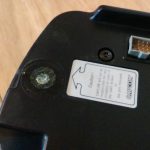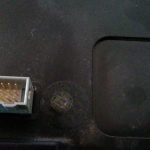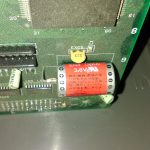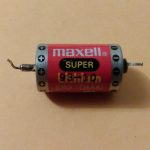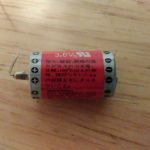Excerpt from the novel The Stand 
 by Stephen King
by Stephen King 

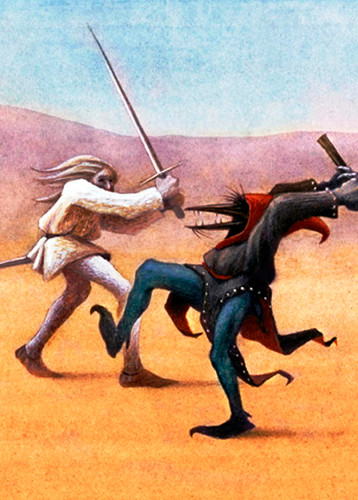
The dark man had set his gaurdposts all along the eastern border of Oregon. The largest was at Ontario, where I-80 crosses over from Idaho; there were six men there, quartered in the trailer of a large Peterbilt truck. They had been there for more than a week, playing poker the whole time with twenties and fifties as useless as Monopoly money. One man was almost sixty thousand dollars ahead and another—a man whose working wage in the pre-plague world had been about ten thousand dollars a year—was over forty grand in the bucket.
It had rained almost the whole week, and tempers in the trailer were getting short. They had come out of Portland, and they wanted to get back there. There were women in Portland. Hung from a spike was a powerful two-way radio, broadcasting nothing but static. They were waiting for the radio to broadcast two simple words: Come home. That would mean that the man they were looking for had been captured somewhere else.
The man they were looking for was approximately seventy years old, heavyset, balding. He wore glasses and he was driving a white-over-blue four-wheel drive, either a jeep or an International Harvester. He was to be killed when he was finally spotted.
They were edgy and bored—the novelty of high-stakes poker for real money had worn off two days ago, even for the dullest of them—but not bored enough to just take off for Portland on their own. They had received their orders from the Walkin Dude himself, and even after rain-induced cabin fever had set in, their terror of him remained. If they screwed the job up and he found out, God help them all.
So they sat and played cards and watched by turns at the sight-slit which had been carved through the side of the trailer’s steel wall. I-80 was deserted in the dull, constant rain. But if the Scout happened along, it would be seen… and stopped.
“He’s a spy from the other side,” the Walkin Dude had told them, that horrible grin wreathing his chops. Why it was so horrible none of them could have said, but when it turned your way you felt as if your blood had turned to hot tomato soup in your veins. “He’s a spy and we could welcome him in with open arms, show him everything, and send him back with no harm done. But I want him, I want them both. And we’re going to send their heads back over the mountains before the snow flies. Let them chew on that all winter.” And he bellowed hot laughter at the people he had gathered together in one of the conference rooms at the Portland Civic Center. They smiled back, but their smiles were cold and uneasy. Aloud they might congratulate each other on having been singled out for such a responsibility, but inside, they wished that those happy, awful, weasel-like eyes had fixed on anyone but them.
There was another large guardpost far south of Ontario, at Sheaville. Here there were four men in a small house just off I-95, which meanders down toward the Alvord Desert, with its weird rock formations and its dark, sullen streams of water.
The other posts were manned by pairs of men, and there were an even dozen of them, ranging from the tiny town of Flora, just off Route 3 and less than sixty miles from the Washington border, all the way down to McDermitt, on the Oregon-Nevada border.
An old man in a blue-and-white four-wheel drive. The instructions to all the sentinels were the same: Kill him, but don’t hit him in the head. There was to be no blood or bruise above the Adam’s apple.
“I don’t want to send back damaged goods,” Randy Flagg told them, and clacked and roared his horrible laughter.
The northern border between Oregon and Idaho is marked by the Snake River. If you were to follow the Snake north from Ontario, where the six men sat in their Peterbilt playing spit-in-the-ocean for worthless money, you would eventually come to within spitting distance of Copperfield. The Snake takes a kink here that geologists call an oxbow, and near Copperfield the Snake was dammed by the Oxbow Dam. And on that seventh day of September, as Stu Redman and his party trudged up Colorado Highway 6 over a thousand miles to the east and south, Bobby Terry was sitting inside the Copperfield Five-and-Dime, a stack of comic books by his side, wondering what sort of shape the Oxbow Dam was in, and if the sluice gates had been left open or shut. Outside, Oregon Highway 86 ran past the dime store.
He and his partner, Dave Roberts (now asleep in the apartment overhead), had discussed the dam at great length. It had been raining for a week. The Snake was high. Suppose that old Oxbow Dam decided to let go? Bad news. A rushing wall of water would sweep down on Copperfield and ole Bobby Terry and ole Dave Roberts might be washed all the way down to the Pacific Ocean. They had discussed going over to the dam to look for cracks, but finally just hadn’t dared. Flagg’s orders had been specific: Stay under cover.
Dave had pointed out that Flagg might be anywhere. He was a great traveler, and stories had already sprung up about the way he could suddenly appear in a small, out-of-the-way burg where there were only a dozen people repairing power lines or collecting weapons from some army depot. He materialized, like a ghost. Only this was a grinning black ghost in dusty boots with rundown heels. Sometimes he was alone, and sometimes Lloyd Henreid was with him, behind the wheel of a great big Daimler automobile, black as a hearse and just as long. Sometimes he was walking. One moment he wasn’t there, and the next moment he was. He could be in L.A. one day (or so the talk went) and show up in Boise a day later… on foot.
But as Dave had also pointed out, not even Flagg could be in six different places at the same time. One of them could just scoot over to that damn dam, have a look, and scoot back. The odds in their favor were a thousand to one.
Good, you do it, Bobby Terry told him. You have my permission. But Dave had declined the invitation with an uneasy grin. Because Flagg had a way of knowing things, even if he didn’t turn up on the dime. There were some who said he had an unnatural power over the predators of the animal kingdom. A woman named Rose Kingman claimed to have seen him snap his fingers at a number of crows sitting on a telephone wire, and the crows fluttered down onto his shoulders, this Rose Kingman said, and she further testified that they had croaked “Flagg… Flagg… Flagg…” over and over.
That was just ridiculous, and he knew it. Morons might believe it, but Bobby Terry’s mother Delores had never raised any morons. He knew the way stories got around, growing between the mouth that spoke and the ear that listened. And how happy the dark man would be to encourage stories like that.
But the stories still gave him an atavistic little shiver, as though at the core of each there was a nugget of truth. Some said he could call the wolves, or send his spirit into the body of a cat. There was a man in Portland who said he carried a weasel or a fisher or something less nameable than either in that ratty old Boy Scout pack he wore when he was walking. Stupid stuff, all of it. But… just suppose he could talk to animals, like a satanic Dr. Doolittle. And suppose he or Dave walked out to look at that damn dam in a direct contradiction of his orders, and was seen.
The penalty for disobedience was crucifixion.
Bobby Terry guessed that old dam wouldn’t break, anyway.
He shot a Kent out of the pack on the table and lit up, grimacing at the hot, dry taste. In another six months, none of the damn cigarettes would be smokable. Pobably just as well. Fucking things were death, anyway.
He sighed and took another comic book off the stack. Some ridiculous fucking thing called Teenage Mutant Ninja Turtles. The Ninja Turtles were supposed to be “heroes on a half-shell.” He threw Raphael, Donatello, and their numbfuck buddies across the store and the comic book they inhabited fluttered down in a tent shape on top of a cash register. It was things like the Teenage Mutant Ninja Turtles, he thought, that made you believe that the world was maybe just as well off destroyed.
He picked up the next one, a Batman—there was a hero you could at least sort of believe in—and was just turning to the first page when he saw the blue Scout go by out front, heading west. Its big tires splashed up muddy sheets of rainwater.
Bobby Terry stared with his mouth ajar at the place where it had passed. He couldn’t believe that the vehicle they were all looking for had just passed his post. To tell the truth, way down deep he had suspected this whole thing was nothing but a make-work shit detail.
He rushed to the front door and jerked it open. He ran out on the sidewalk, still holding the Batman comic book in one hand. Maybe the thing had been nothing but a hallucination. Thinking about Flagg could get anyone hallucinating.
But it wasn’t. He caught a glimpse of the Scout’s roof as it went down over the next hill and out of town. Then he was running back through the deserted five-and-dime, bawling for Dave at the top of his lungs.
Like this:
Like Loading...
![]() came out today to give my broken down Super-Turbo
came out today to give my broken down Super-Turbo ![]()
![]() arcade machine a sorely needed tune-up.
arcade machine a sorely needed tune-up.![]()
![]() , the previous iteration of the game. About three months ago, the power supply burned out which rendered it unplayable, but a new $40 replacement part installed by a pair of skillful hands from SKL got the game running again in no time. Most of the display issues were also fixed through fairly simple adjustments and recalibrations. The screen-jiggle persists, however, as the monitor PCB will need new capacitors for this to be corrected. This is a relatively minor visual problem and a decent amount of time will be necessary to perform the repair, so it will be a job for another day.
, the previous iteration of the game. About three months ago, the power supply burned out which rendered it unplayable, but a new $40 replacement part installed by a pair of skillful hands from SKL got the game running again in no time. Most of the display issues were also fixed through fairly simple adjustments and recalibrations. The screen-jiggle persists, however, as the monitor PCB will need new capacitors for this to be corrected. This is a relatively minor visual problem and a decent amount of time will be necessary to perform the repair, so it will be a job for another day.![]() circa 1991 and it likely housed Captain America and the Avengers
circa 1991 and it likely housed Captain America and the Avengers ![]()
![]() when it was produced.
when it was produced.![]()
![]() .
.![]() game boards, it might be appropriate for me to pick up a copy of Marvel vs Capcom
game boards, it might be appropriate for me to pick up a copy of Marvel vs Capcom ![]()
![]() at some point in the future. CPS-2 uses what are essentially giant cartridges and this allowed a Capcom arcade system to be transformed from one game into another without much difficulty. Other CPS-2 titles include Super Street Fighter II (mentioned above), X-Men: Children of the Atom, Dungeons & Dragons, X-Men vs Street Fighter, Darkstalkers, and the entire Street Fighter Alpha series.
at some point in the future. CPS-2 uses what are essentially giant cartridges and this allowed a Capcom arcade system to be transformed from one game into another without much difficulty. Other CPS-2 titles include Super Street Fighter II (mentioned above), X-Men: Children of the Atom, Dungeons & Dragons, X-Men vs Street Fighter, Darkstalkers, and the entire Street Fighter Alpha series.




